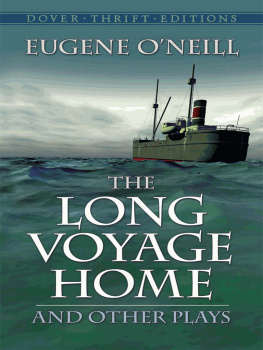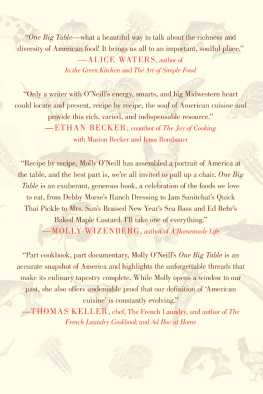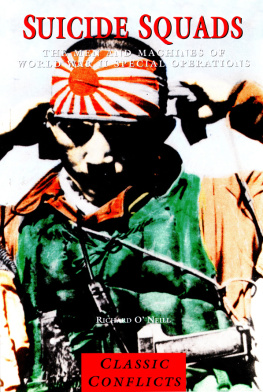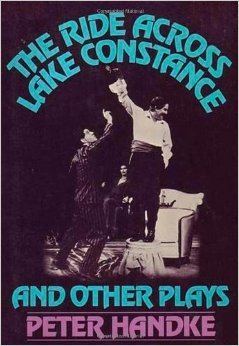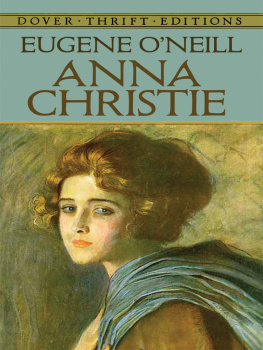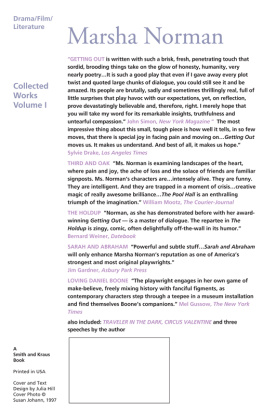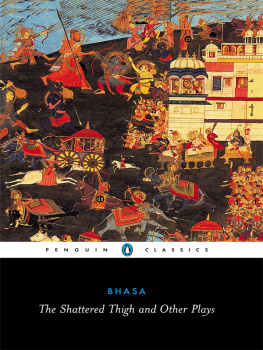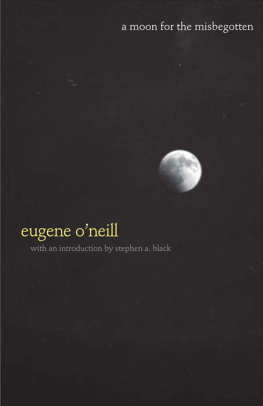DOVER THRIFT EDITIONS
The Long Voyage Home and Other Plays
EUGENE ONEILL

DOVER PUBLICATIONS, INC.
Mineola, New York
DOVER THRIFT EDITIONS
GENERAL EDITOR: STANLEY APPELBAUM
EDITOR OF THIS VOLUME: ALAN WEISSMAN
Copyright
Copyright 1995 by Dover Publications, Inc.
All rights reserved.
Theatrical Rights
This Dover Thrift Edition may be used in its entirety, in adaptation or in any other way for theatrical productions, professional and amateur, in the United States, without fee, permission or acknowledgment. (This may not apply outside of the United States, as copyright conditions may vary.)
Bibliographical Note
This Dover edition, first published in 1995 and reissued in 2016, is an unabridged republication of The Moon of the Caribbees, Bound East for Cardiff, The Long Voyage Home and In the Zone, all originally published by Boni & Liveright, New York, in the volume The Moon of the Caribbees and Six Other Plays of the Sea, 1919. A new Note has been written specially for this edition.
Library of Congress Cataloging-in-Publication Data
ONeill, Eugene, 18881953.
[Plays. Selections]
The long voyage home and other plays / Eugene ONeill.
p. cm. (Dover thrift editions)
Originally published: New York: Boni & Liveright, 1919.
Contents: The moon of the Caribbees Bound east for Cardiff The long voyage home In the zone.
eISBN-13: 978-0-486-15917-1
I. Title. II. Series.
PS3529.N5A61995b
812'. 52dc20
95-35219
CIP
Manufactured in the United States by RR Donnelley
28755603 2016
www.doverpublications.com
Note
It is often said that nothing of literary value written by an American for the American stage was performed there before the plays of Eugene ONeill came along. This assertion, if not literally true, is very nearly so, for the vast majority of the plays written by Americans and publicly performed in this country before and for two decades after the turn of the century were sentimental melodramas, low-grade farces or other vehicles of light entertainment.
Beyond the Horizon (1920) was the first of ONeills many plays to be performed on Broadway. The actual beginning of his public career was, however, experienced only by the fortunate few who saw a performance of Bound East for Cardiff by the Provincetown Players in Provincetown, Massachusetts, in February 1916, or a few months later in New York. In the next few years this influential group performed a number of ONeills one-act plays, to the benefit of both ONeills reputation and their own. Four of these plays (including Bound East for Cardiff) are reprinted here. These little dramas, ONeills first important works, are linked by a number of characters that appear in more than one and to that degree make the plays a series. All of these characters work on the S.S. Glencairn, a British tramp steamer, aboard which the action of three of the four plays is set.
Each of these dramas tells a different story and evokes a different mood but all are marked by economy of structure, careful attention to dialogue, and a gritty naturalism hitherto unknown except for a few foreign imports on the American stage.
The four plays were written between 1913 and 1917 and first published in 1919 (in 1924 they were published under the collective title S.S. Glencairn). The order in which they appear here is that in which the incidents enacted are supposed to have occurred.
Contents
The Moon of the Caribbees
A PLAY IN ONE ACT
CHARACTERS

LAMPS, the lamptrimmer.
CHIPS, the carpenter.
OLD TOM, the donkeyman.

THE FIRST MATE
Two other seamen SCOTTY AND IVAN and several other members of the stokehole-engine-room crew.
NOTE. With the exception of In the Zone, the action of all the plays in this volume takes place in years preceding the outbreak of the World War.
SCENE A forward section of the main deck of the British tramp steamer Glencairn, at anchor off an island in the West Indies. The full moon, half-way up the sky, throws a clear light on the deck. The sea is calm and the ship motionless.
On the left two of the derrick booms of the foremast jut out at an angle of forty-five degrees, black against the sky. In the rear the dark outline of the port bulwark is sharply defined against a distant strip of coral beach, white in the moonlight, fringed with coco palms whose tops rise clear of the horizon. On the right is the forecastle with an open doorway in the center leading to the seamens and firemens compartments. On either side of the doorway are two closed doors opening on the quarters of the Bosun, the ships carpenter, the messroom steward, and the donkeyman what might be called the petty officers of the ship. Near each bulwark there is also a short stairway, like a section of fire escape, leading up to the forecastle head (the top of the forecastle) the edge of which can be seen on the right.
In the center of the deck, and occupying most of the space, is the large, raised square of the number one hatch, covered with canvas, battened down for the night.
A melancholy negro chant, faint and far-off, drifts, crooning, over the water.
Most of the seamen and firemen are reclining or sitting on the hatch. PAUL is leaning against the port bulwark, the upper part of his stocky figure outlined against the sky. SMITTY and COCKY are sitting on the edge of the forecastle head with their legs dangling over. Nearly all are smoking pipes or cigarettes. The majority are dressed in patched suits of dungaree. Quite a few are in their bare feet and some of them, especially the firemen, have nothing on but a pair of pants and an undershirt. A good many wear caps.
There is the low murmur of different conversations going on in the separate groups as the curtain rises. This is followed by a sudden silence in which the singing from the land can be plainly heard.
DRISCOLL [A powerfully built Irishman who is sitting on the edge of the hatch, front irritably.] Will ye listen to them naygurs? I wonder now, do they call that keenin a song?
SMITTY [A young Englishman with a blond mustache. He is sitting on the forecastle head looking out over the water with his chin supported on his hands.] It doesnt make a chap feel very cheerful, does it? [He sighs.]
COCKY [A wizened runt of a man with a straggling gray mustache slapping SMITTY on the back.] Cheero, ole dear! Downt be ser dawhn in the marf, Duke. She loves yer.
SMITTY [Gloomily.] Shut up, Cocky! [He turns away from COCKY and falls to dreaming again, staring toward the spot on shore where the singing seems to come from.]
BIG FRANK [A huge fireman sprawled out on the right of the hatch waving a hand toward the land.] They bury somebody py chiminy Christmas, I tink so from way it sound.
YANK [A rather good-looking rough who is sitting beside DRISCOLL.] What dyuh mean, bury? They dont plant em down here, Dutchy. They eat em to save funral expenses. I guess this guy went down the wrong way an they got indigestion.

